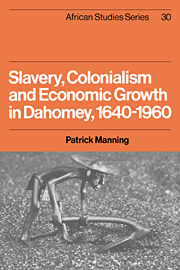Book contents
- Frontmatter
- Contents
- Maps
- Tables
- Figures
- Preface
- 1 Slavery, colonialism and economic growth, 1640–1960
- 2 The Dahomean economy, 1640–1890
- 3 Struggles with the gods: economic life in the 1880s
- 4 Production, 1890–1914
- 5 Demand, 1890–1914
- 6 Exchange, 1890–1914
- 7 The alien state, 1890–1914
- 8 Social struggles for economic ends, 1890–1914
- 9 The mechanism of accumulation
- 10 Capitalism and colonialism, 1915–60
- 11 The Dahomean national movement
- 12 Epilogue
- Notes
- Appendix 1 Export revenue from Dahomey, 1640s–1950s
- Appendix 2 Slave exports by ethnic origin
- Appendix 3 Population loss due to slave exports
- Appendix 4 Foreign trade of Dahomey
- Appendix 5 Foreign trade indices
- Appendix 6 Rainfall
- Appendix 7 Fiscal flows
- Appendix 8 Money supply of colonial Dahomey
- Bibliography
- Index
10 - Capitalism and colonialism, 1915–60
Published online by Cambridge University Press: 26 October 2009
- Frontmatter
- Contents
- Maps
- Tables
- Figures
- Preface
- 1 Slavery, colonialism and economic growth, 1640–1960
- 2 The Dahomean economy, 1640–1890
- 3 Struggles with the gods: economic life in the 1880s
- 4 Production, 1890–1914
- 5 Demand, 1890–1914
- 6 Exchange, 1890–1914
- 7 The alien state, 1890–1914
- 8 Social struggles for economic ends, 1890–1914
- 9 The mechanism of accumulation
- 10 Capitalism and colonialism, 1915–60
- 11 The Dahomean national movement
- 12 Epilogue
- Notes
- Appendix 1 Export revenue from Dahomey, 1640s–1950s
- Appendix 2 Slave exports by ethnic origin
- Appendix 3 Population loss due to slave exports
- Appendix 4 Foreign trade of Dahomey
- Appendix 5 Foreign trade indices
- Appendix 6 Rainfall
- Appendix 7 Fiscal flows
- Appendix 8 Money supply of colonial Dahomey
- Bibliography
- Index
Summary
The issues which had been engaged at the beginning of the twentieth century were played out more fully through the remainder of the colonial period. But if political change overshadowed economic change in Dahomey's early colonial years, the middle and late colonial years brought the reverse. The economic dislocation of the period 1915–60 included two wars, a great depression, three periods of rapid inflation, and the rise to dominance of the capitalist mode of production. The economy continued its growth almost half-way through this tumultuous period, but contracted from the thirties to the fifties; when it began to grow again it did so as a substantially transformed economy, in which the role of the state had become determinant. The florescence of capitalism in Dahomey, therefore, far from ushering in a period of growth and prosperity, coincided instead with an era of stagnation and privation.
The analysis of Dahomey's economic history from 1915 to 1960 begins with a review of available statistical series on foreign trade, public finance and money. Based on this and supplementary information, we shall then turn to exploration of Dahomey's major economic transformations: in the rate of growth, in the role of the state, and in overall social formation.
ECONOMIC INDICATORS, 1915–60
The structure of Dahomey's exports continued its modest evolution after 1914. By the end of the colonial period, peanuts and coffee had joined cotton as significant contributors to export revenue. Recorded fish exports tended to decline with time, and maize, of which large quantities were exported from 1934 to 1945, again disappeared from export trade after World War II.
- Type
- Chapter
- Information
- Slavery, Colonialism and Economic Growth in Dahomey, 1640–1960 , pp. 230 - 260Publisher: Cambridge University PressPrint publication year: 1982



